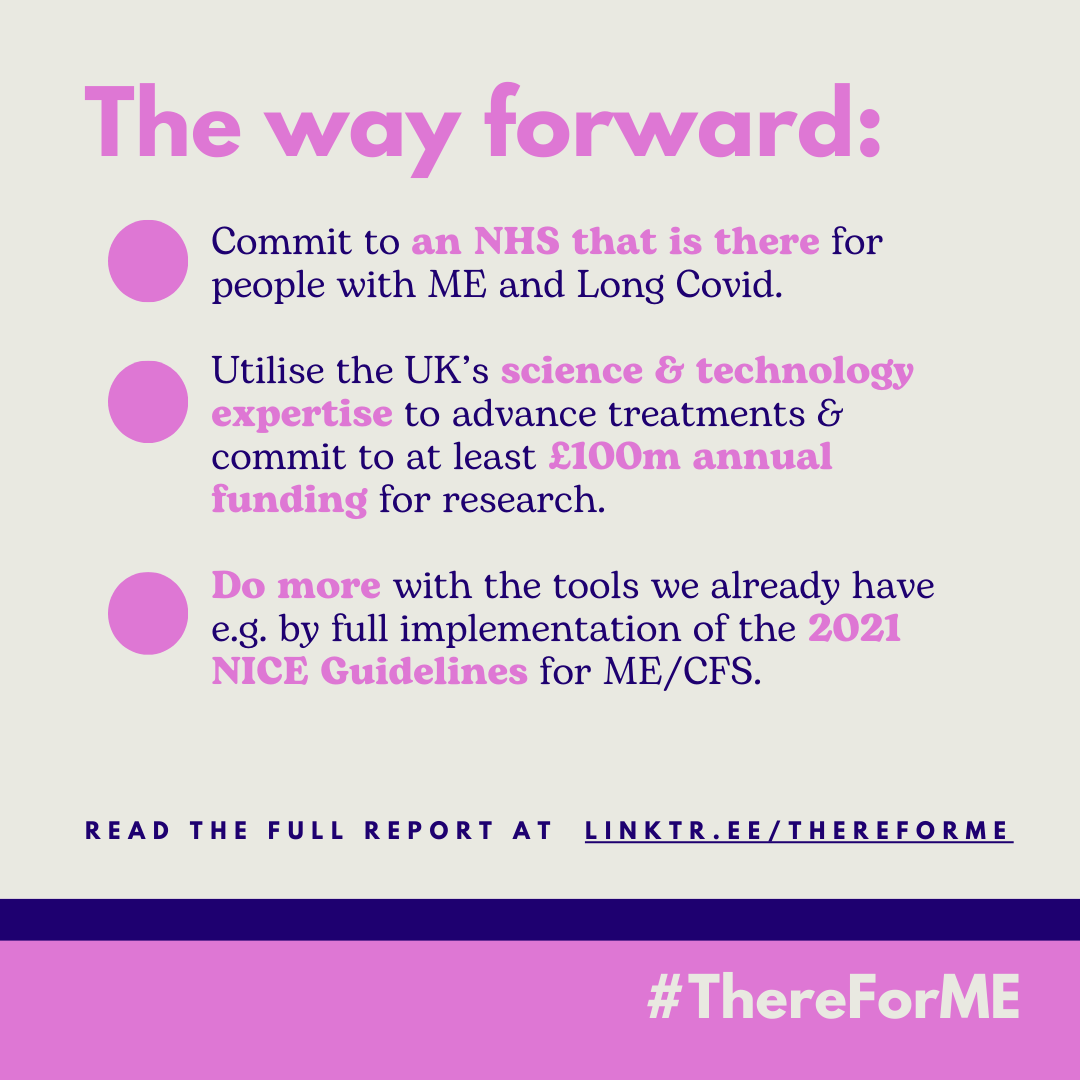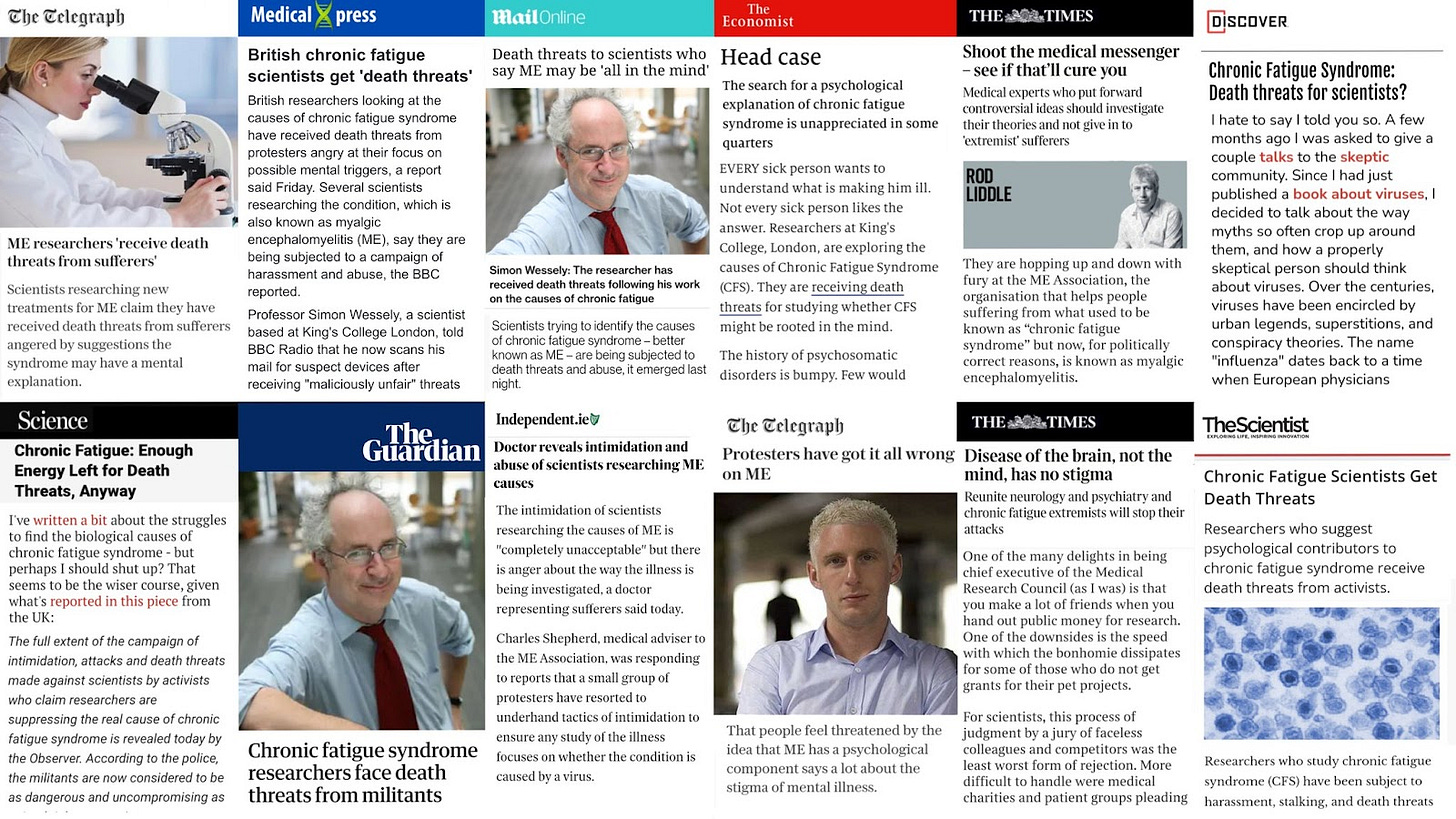Campaign Update #9: Scrutiny matters
Miranda, Monbiot and MPs
Here at #ThereForME HQ, we’ve been talking a lot lately about scrutiny. Many people with ME are well familiar with how a lack of scrutiny has for decades held back safe care and biomedical research for ME, with unsafe approaches to treatment normalised for far too long. For decades the idea that the condition was psychosomatic was accepted as the orthodoxy for ME, both in healthcare and across society. And for too long important questions went unasked by those with the power to do so.
Thinking critically matters. A couple of weeks ago we wrote about signs that the media is starting to ask the right questions. Since then, we’ve been thinking who else needs to be asking questions - and what good scrutiny would look like. Here’s some developments in the past few weeks that we think show promising signs of more comprehensive, better quality scrutiny, while also highlighting the dangers of failing to do so.
Miranda Hart
We’ve been following the press around the publication of comedian Miranda Hart’s book I Haven’t Been Entirely Honest With You. We are concerned, as many in the community are, about the book’s implications that managing the “brain’s heightened stress response” is the cure for ME, Long Covid and Lyme.
For those unaware of the history of the treatment of ME, it may not be clear quite how damaging this is. The view that ME was a psychological rather than physiological illness dominated for decades and has led to a lack of proper research funding and insufficient care. Sadly, patients like Karen Gordon and Carla Naoum are in hospital suffering the effects of this as we write. The historical approach to ME has undoubtedly impacted the understanding and treatment of the ME-type of Long Covid. Many patients with ME, such as Miranda, also have chronic Lyme disease (or borreliosis): a disease with symptoms that overlap significantly with ME and which suffers the same lack of appropriate treatment.
People suffering with ME, Long Covid and Lyme need an NHS that’s there for them; they must not be left to rot under the assumption that a self-help programme will cure them. We are calling for safe, evidence-informed care and biomedical research to find effective treatments.
That said, Miranda has done a lot to raise awareness - and we wish she would do more with her platform to echo our calls. A number of people have commented that Miranda talking publicly about ME has made it easier for them to discuss their illness with their friends and relatives. We were glad to see that Miranda has made it clear in some recent social media posts that she is not a medic and does not profess to have the cure. Like other advocates (not least our friends at Long Covid Advocacy), we’ve reached out to Miranda in the hope that she’ll be open to discussing with us how she can be a better ally in future.
Her book has made a big splash, but at the same time it has muddied the waters with its reference to outdated and discredited treatment. What we’ve found the most noticeable, however, is how some of her more questionable claims have met significant scrutiny. While it was unsurprising to see concerns raised from the ME community, it was refreshing to see acknowledgement of these criticisms in the media (The Telegraph, the Independent and the Daily Mail). We hope that the discussion being “out there” will lead to greater understanding among the general public and decision makers about unproven treatments, as well as the dangers of taking questionable claims about ME, and how to treat it, at face value .
George Monbiot
George Monbiot’s article in the Guardian last week highlighted an example of the dangers of this outdated view of ME being a psychological illness: Maeve Boothby O’Neill died because of it.
His explanation of how this view took hold is fascinating and very concerning for those putting their trust in scientists, medics and the media. He details how an organisation called the Science Media Centre - with key personnel linked to an extreme right-wing group called the RCP (Revolutionary Communist Party), with ties to Viktor Orban and Nigel Farage - has influenced the narrative around ME. Monbiot’s article covers the now infamous PACE trial, the denial of freedom of information requests made regarding the trial, and how proponents of the biopsychosocial approach exaggerated isolated instances of abuse when criticisms were made.
Monbiot remarks that the media repeated these claims and did not apply sufficient scrutiny. Instead, as he explains “medicine gave way to groupthink”. Monbiot finished his article with a powerful call to action, which bears repeating: “those who suffer the most should be listened to the most”. With transformed media coverage of ME lately, we’re hoping that the voices of those suffering are starting to cut through.
Questions in parliament
Finally, for the parliamentary nerds among us (read ‘Karen’), it was exciting to see parliament finally back in session on 7 October. Parliamentary scrutiny is the bedrock of good governance, and it’s something we would like to see more of when it comes to ME and Long Covid. We decided in #ThereForME HQ that October would be ‘Parliamentary Scrutiny Month’ and so far, MPs across the house have been helping us to deliver.
Karen shared an explainer on X/Twitter of some recent parliamentary questions and what we can decipher from them, including that:
There are no current plans from NICE to update their 2021 guideline for managing Long Covid (which, given three years of research and evolving understanding, is quite the statement).
DHSC is working off data from *March 2023* when 4.41% of healthcare workers and 5.33% of social workers reported Long Covid - and has no estimate of numbers out of the NHS workforce as a result (again, quite the statement).
DHSC has made no specific assessment of the adequacy of the safety of NHS care for severe and very severe ME patients (sigh).
Despite claiming it is a priority, DHSC officials are still in the process of finalising a summary from the ME/CFS delivery plan consultation. On this timeline we’d predict the consultation results published this year - and the plan in the first months of 2025 (prove us wrong DSHC!)
So, after a promising start we’re working up plans to deepen parliamentary scrutiny in the coming months, in coordination with the organisations supporting our campaign. More on this soon - but for now, if your MP has been supportive on ME/Long Covid, let us know! We’re building a list of allies in parliament and would love to add more names to it.
That’s all for now - until next time.







Thinking critically is exactly what the British medical establishment has been unable to do for a very long time for many illnesses, dominated as it is by very conservative forces. In his interview with me Dr William Weir explained how the history of the UK medical establishment is dominated by dogmatic thinking which is very resistant to change. This has led to the persecution of doctors like Sarah Myhill who has helped so many pwME over several decades.
The history of the UK medical establishment is littered with examples of human disease being initially explained by dogma created by powerful authoritarian figures.
This dogma is the result of a void in the comprehension of a particular disease, which is later replaced by rational scientific understanding.
One famous example of the medical profession “getting it wrong’’ was the dogmatic belief that bloodletting was an effective treatment for cholera in the mid-19th century. It ignored the findings of John Snow, which explained that contaminated water caused cholera, for over 3 decades.
"Throughout history, a pattern tends to repeat itself when natural phenomena require explanation. Dogma usually arrives first, then it is eventually replaced by scientific understanding. The same pattern is unfolding in relation to ME/CFS, but supporters of the psychological dogma surrounding its causation remain stubbornly resistant, even in the face of compelling scientific evidence to the contrary."
—Dr. William Weir and Dr. Nigel Speight 2021
I have to say that I am not sympathetic to people like the author you mention who talk approvingly about harmful therapies for ME. I've got to the point in life where people whose efforts are harmful to myself and others struggling like me who don't have a voice make me very angry. I've spent my whol e life fighting injustice and you only get change through hard fought battles with authority.
George Monbiot's article was a brilliant expose of the medical abuse suffered by pwME. There needs to be a push to get MPs to join the APPG for ME and get educating these MPs about our lived experience of ME.
We also need to approach the newly created ICBs as they have great power over the commissioning of health services in each region. In my region one of the ICB directors, who we have been talking with for over a year now, is going to raise my points regarding lessons to be learned from the preventable death of Maeve Boothby O'neill with the medical director of the ICB.
From a new subscriber, who has just passed 1000 days of ME-style long covid: thank you so much for your work.